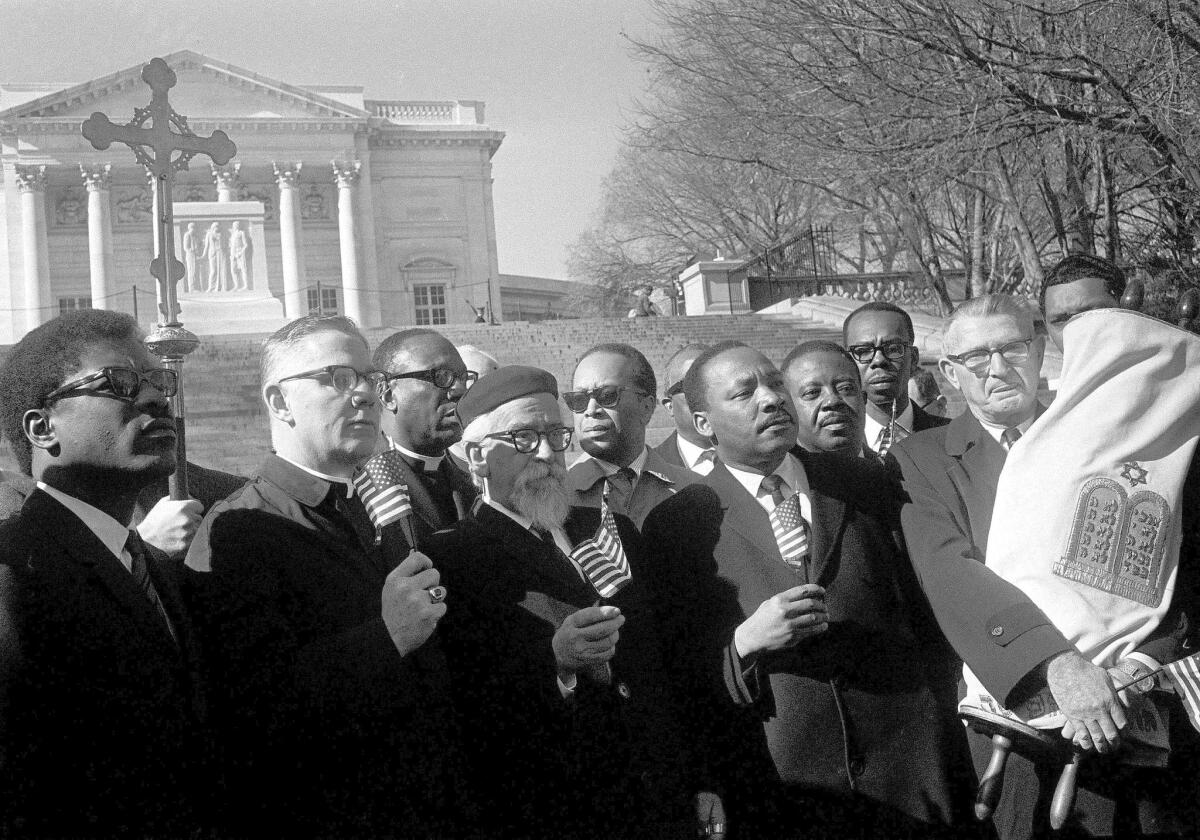Op-Ed: Religious Americans of all stripes should join the rabbis who protested against Trump at AIPAC

Leaders in a Vietnam war protest—including Rabbi Abraham Heschel, front row, center—stand in silent prayer at Arlington National Cemetery on Feb. 6, 1968.
- Share via
When rabbis walked out of Donald Trump’s speech Monday night at the national convention of the American Israel Public Affairs Committee in Washington, they were literally turning their backs on the man who has been compared — rightly or not — to some of the worst haters in modern history.
While it’s dubious that Trump is a fellow traveler of Hitler, it is not dubious that he spews contempt with the ease of a born hate-monger. Trump hasn’t said anything truly noxious about Jews; he always demurs that he cannot be anti-Semitic because his daughter converted to Judaism. But the AIPAC protest was right because hate toward one people easily spills over into hate toward others, right because of the tragic history of the Jewish people, right because of the Judeo-Christian prophetic tradition, a moral reflex to denounce injustice, iniquity and corruption, even when that truth is unwanted and, as too often happens, is frustratingly unheeded.
Perhaps the finest embodiment of this tradition in the 20th century was Rabbi Abraham Heschel, of the Jewish Theological Seminary in New York, who in the 1960s reached out to the poor, the disenfranchised, the forgotten of all faiths. His colleagues-in-empathy were such Christian luminaries as Dorothy Day, Thomas Merton and Martin Luther King Jr. All of them saw beyond the divisions of ideology and theology; all knew, as Heschel wrote, that “when religion speaks only in the name of authority rather than the voice of compassion, its message becomes meaningless. Religion is an answer to humanity’s ultimate questions. We need to rediscover the questions to which religion is an answer.”
In some perverse way, Trump is providing a public service by forcing us to do as Heschel commanded. For the religious, the questions will be spiritual and theological. For the secular, they will be questions of civil comity and polity and national purpose.
There are many precedents for the rabbis’ protest Monday night. Marching in 1965 with King in Selma, Heschel said his “feet were praying,” a holy rebuke to the violent and immoral legacy of segregation. Two years earlier with King jailed in Birmingham, Ala., for local protests, eight white ministers publicly stated that King, and the civil rights movement, should temporize. Change, they said, will come, just not on King’s disruptive, presumptive schedule. From his cell, King responded that if the Christian theologian Paul Tillich was right and sin is separation, then “is not segregation an existential expression of man’s tragic separation, his awful estrangement, his terrible sinfulness?” King also reminded those who resisted civil rights that, when early Christians entered a town, the powerful tarred them as “outside agitators.” “But the Christians pressed on,” King noted, “in the conviction that they were ‘a colony of heaven,’ called to obey God rather than man.”
Clergy of all faiths -- rabbis, priests, ministers, imams -- should rise boldly and vociferously against [Donald Trump].
The prophetic impulse survived even in Nazi Germany. A pastor in the Rhineland courageously told his superiors that anti-Jewish violence violates “the simplest moral judgment…. I have never doubted my people as deeply as now.” Wrong, said church leaders, revealing their own anti-Semitism. The violence was a “legitimate outlet” for the “resentments at what the Jewish-dominated press, stock exchange and theater have done to us.” German Protestants were so staunchly pro-Hitler that one renegade church newspaper bravely published a vision of a worship service of the future: Standing at the altar, a minister tells anyone not 100% Aryan to leave the church. No one moves. He repeats the announcement. Again, everyone is still. When the minister repeats it again, Christ climbs down from the cross over the altar and walks out the door. Even Jesus was disgusted with German Christians.
In Berlin, theologian Dietrich Bonhoeffer unrelentingly preached against the Nazis, arguing that helping Jews was a matter of theological necessity: Jews and Christians were united in the person of Jesus Christ. Eventually, Bonhoeffer warned, the Lord will “judge, condemn, and topple into the dust” anyone who worshipped the clay idols of the Nazis. After great agonizing, Bonhoeffer decided that loving his neighbor meant killing Hitler. Jailed for the botched July 20, 1944, attempt, Bonhoeffer accepted his guilt while lamenting the moral bankruptcy of the church. The Nazis hanged Bonhoeffer two weeks before the war ended.
Trump is not Hitler, and unlike Bonhoeffer’s tortured decision to help kill the Fuehrer, no violence should be visited upon him. But clergy of all faiths — rabbis, priests, ministers, imams — should rise boldly and vociferously against him. He is too large a threat to be left to the mobs he has incited. Prayers can propel feet and feet can take action, all nonviolent, sacred and, yes, prophetic. Across the country, Sabbath services can be devoted to exhortations toward brotherhood. Clergy can lay down in front of entrances to Trump rallies. They can lock themselves with chains to the doors of those rallies. They can link arms and encircle the venues of those rallies. Christian clergy should refuse him communion. He should find no churchly refuge within our borders.
To date, there have been a few scattered clerical alarums against Trump. It is time to raise the volume, as the rabbis in Washington did Monday night.
Arthur J. Magida’s last book is “The Nazi Séance: The True Story of the Jewish Psychic in Hitler’s Circle.” He is writer-in-residence at the University of Baltimore.
Follow the Opinion section on Twitter @latimesopinion and Facebook
A cure for the common opinion
Get thought-provoking perspectives with our weekly newsletter.
You may occasionally receive promotional content from the Los Angeles Times.






